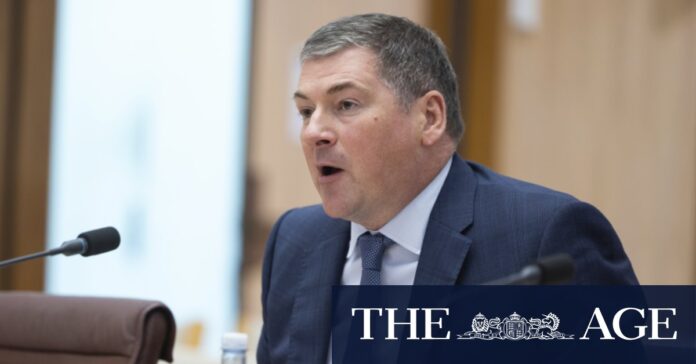[ad_1]
Competition law has so far failed to curtail the “unchecked growth” of Coles and Woolworths, which have engaged in a “long-term pattern and behaviour which is anticompetitive” and allowed them to “further entrench” their market power, he said.
Loading
The inquiry heard that in some cases, when Metcash notified the Australian Competition and Consumer Commission (ACCC) about potentially uncompetitive deals, the regulator did not have the visibility, power, or speed to intervene effectively.
In one case, regarding the sale of a Foodland store in South Australia’s Brighton, Coles made a high offer to purchase the supermarket, which Ramage said Metcash was “forced” to match before reselling it to another independent for a lower price.
“It’s a decapitation strategy,” Ramage said. “You start taking away those big stores, it really cuts into the viability of our independent network.”
“We’re calling for greater protection and a fair go for independent supermarkets, on the basis of not being predated upon by the chains through acquisition…”
Responding to Ramage’s comments, a Woolworths spokesperson said the supermarket was focused on its business of growing stores and servicing communities, not that of its competitors.
“Our customers would expect us to build new stores, distribution centres and other facilities with the number of new stores in recent years mirroring population growth,” the spokesperson said. “Most of our developments in the past five years have been in greenfield areas, including growth corridors, and around a third have been in urban areas that are densifying.”
A Coles spokesperson said construction of a site can take several years after purchasing land. “Once the store is operational, we generally sell the site to a landlord to allow us to invest in building new stores,” the spokesperson said.
“When you go to one of our supermarkets, you will often see an independent bakery, butcher, fruit and vegetable grocer or delicatessen close by, for example, creating competition which ultimately benefits customers.”
No Aldi stores in Tasmania
Neither Metcash nor Aldi, which also appeared at the inquiry on Thursday, support the proposed divestiture powers that the Greens have pushed for. These powers would see supermarkets forced to sell stores if they get too big.

Aldi’s Group Managing Director Viktor Jakupec; Anna McGrath, CEO; and Jordan Lack, Managing Director of National Buying.Credit: Alex Ellinghausen
Ramage said it was unclear whether divestiture powers would provide consumers with extra choice, while Aldi Australia chief executive Anna McGrath warned about potential “unintended consequences”.
“What we wouldn’t want to see is consumers having less choice, or there being less jobs in retail or suppliers,” McGrath told the inquiry.
Tasmanian senators Nick McKim and Tammy Tyrrell also queried why there were no Aldi stores on the island.
Loading
McGrath indicated that there were still areas in metropolitan cities that the German-headquartered supermarket had yet to explore but said that the more distant the location – such as Tasmania or far north Queensland – the more complex supply chains became.
“When we’re identifying where to expand, we need to consider the additional costs and complexities that are involved and therefore when it comes to Tasmania, that would be largely the supply chain elements,” she said. “In saying that, that’s not to say we don’t continuously review where we may expand in the future.”
The Senate inquiry into supermarket prices will continue next Monday and Tuesday, when outgoing Woolworths chief Brad Banducci and Coles boss Leah Weckert are due to appear.
[ad_2]
Source link


